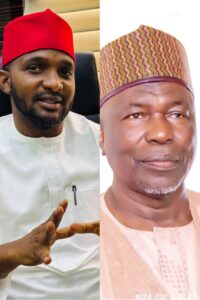
By Abdelghaffar Amoka Abdelmalik
I was reflecting over the demands of the Academic Staff Union of Universities (ASUU) and the response of the Government and I remembered the slogan of University of Leicester while I was there as a PhD student. “Elite without being elitist – University of Leicester”. The University picked up the slogan because Leicester was the only top-20 university in the UK that does very good research, teaching, and at the same time, was an inclusive university.
What is the difference between Elite and Elitist? Elites are best-educated, or best-trained group in a society. Elitists, on the other hand, are a group of people in a society that care not about the interests or values of ordinary people.
All that ASUU is struggling for is to have public universities in Nigeria that are not Elitists to groom Elites. ASUU believes that Nigerians deserve public universities with very good research and teaching activities as obtainable any where in the world, and at the same time an inclusive university that is affordable to all.
But the Elitist political office holders don’t think that should be the case. While they are aware of the bad state of the infrastructures of public universities that made them to patronize private and foreign universities for their kids, they are claiming Nigeria has got no funds to revitalize the public universities. The government is borrowing to fund critical infrastructures but the education sector is not part of the critical institutions to fund its infrastructures. Ironically, they still profess that for the nation to get it right, we must fix education. I am still wondering how they intend to fix education without proper funding.
Meanwhile, the major headlines after the last Wednesday’s edition of the deadlocked meetings was that, “We cannot afford the N110 billion demanded by the ASUU for funding of revitalization of public universities.” (Chris Ngige, the Minister of Labour and Employment).
We were told that a nation cannot develop beyond the level of education of the people and yet my country has no enough fund for the education of the people. The question then is how do we develop the nation and how critical is the education of the people to these Elitists?
Let us have a brief reminder of ASUU’s engagement with FG from 2009 with more emphasis on the revitalization of public universities. As a follow up on the ASUU-FG agreement in 2009 during Yar’adua’s administration, the government of Goodluck Jonathan setup a committee on NEEDS Assessment of public universities in 2012 under the Chairmanship of Prof. Mahmood Yakubu, the then Executive Secretary of TETFund and the current Chairman of INEC. As against the 1.1 trillion naira suggested by ASUU in 2009 for the revitalization of public universities, the NEEDS Assessment committee on the report presented to the the Federal Economic Council in 2012, recommended 1.3 trillion naira to revitalize public universities.
ASUU had to embark on strike before Jonathan’s government released the first tranche of 200 billion naira for 2013. The remaining 1.1 trillion naira was to be spread from 2014 to 2018. When President Buhari was elected in 2015, ASUU attempted to engage the new government for several months. A strike had to be declared in 2017 before they got the attention of the government. The government agreed to release the sum of N220 billion not later than October 2017, to fund the revitalization of federal universities across the country. That money was never released among other things and another strike was declared in 2018.
The strike was suspended in 2019 after an agreement that in addition to the N20 billion commitment for 2018, the sum of N25 billion would be released in April/May 2019, after which government would resume full implementation of the of 2013 MoU.
While still expecting the implementation of 2013 MoU and the revitalization in 2019, Buhari’s govern
ment came up with the implementation of IPPIS. The same IPPIS that the FG agreed cannot work in the universities in 2014 and proposed an alternative for universities. Aside the fact that IPPIS is contrary to University Autonomy Act, the implementation will further reduce the funding of public universities.
University system does not just discard academics like a piece of rag, especially the ones found to be highly resourceful even at old age. Some are retained as Adjunct Professors for as long as they are willing to serve. The whole idea of Visiting and Adjunct Professors in a university is a temporary measure to fill the gap of the non availability of Senior Academics to help sustain the system and also train the younger academics to get to senior cadre. And that is only possible with university autonomy where the Council, the managers of university personnel and payroll system, can use their discretion to effectively utilize the available resources to keep the system working with temporary staff pending the availability of enough tenure Lecturers at senior cadre and retired Professors that are still resourceful in selected fields. If the university is stripped off its autonomy status and handed over to the Accountant General of the Federation (AGOF), that flexibility is lost and universities will treated like Ministries, Department and Agencies. It is either you Employ tenure staff or nothing. And if you must engage temporary academics, the university will have to source for funds to sustain that. Meanwhile, no university in world can operate effectively without Adjunct and Visiting Professors. That is how university system is designed.
ASUU is requesting that N110 billion naira should be released to the universities for revitalization as agreed in 2019 and have suggested to government ways to raise fund to complete the revitalization process, but Ngige is insisting that they can only afford N20 billion for over the 74 public universities. Meanwhile, the imposition of IPPIS with the no fund for revitalization declaration by Ngige is to further reduce the funding of the universities and stagnate the system.
What I think the public should be worried about is the sustenance of our university programs under this policy and their children’s future. If government cannot properly fund the universities, not ready to fund Adjunct and Visiting Professors, and looking for every means to reduce the funds for public universities, then the students will have to fund the system through their parents by increasing school fees.
The next question will be; how many Nigerians will be able to afford to pay a 1000% increase in registration fees? I may not know for others but with increase in the salaries of Lecturers which will surely come, Lecturers. should be able to afford it for their kids. This is just for you to realize that ASUU is “stubbornly” fighting your fight.
So, the ELITISTS whose kids are in universities in the US, UK, Turkey, Cyprus, etc., don’t want you, the ordinary Nigerian, to be exposed to quality education for reasons best known to them and ASUU is fighting to make public Universities, an Elite system, affordable to every Nigerian that wishes to acquire university education.
We have money to build Airport in states without airport, build roads, railways, and to bail out private Investments (banks and airlines), but no money to fund infrastructures in public universities. You have a choice to keep hailing your oppressor or join ASUU for the struggle or count your loss if ASUU should lose the fight. The choice is yours!


